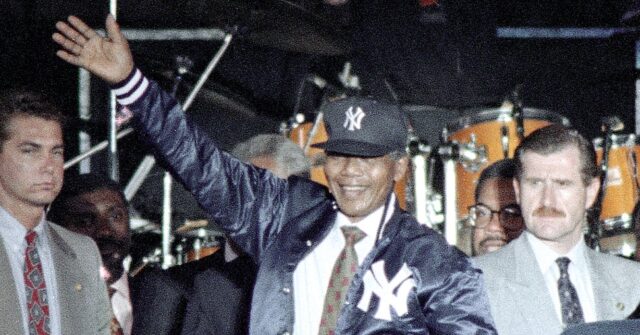In a recently resurfaced report from the Los Angeles Times, Donald Trump is remembered for playing a significant role in Nelson Mandela’s 1990 tour of the United States. As Mandela embarked on a crucial visit to raise awareness and generate support for the anti-apartheid movement, there were considerable logistical challenges in arranging transportation for the iconic freedom fighter and his delegation of approximately 80 people. The report highlights Trump’s unexpected involvement as a last resort, showcasing a side of the former president that contrasts with the prevailing narrative of his alleged racism, which has recently been reiterated by Vice President Kamala Harris’s campaign and some media outlets.
According to the June 25, 1990, article, after a series of failed attempts to secure a suitable flight via negotiations with the U.S. government and private charter companies, Trump stepped in to offer his assistance. Mandela’s party ultimately rented a Trump Shuttle 727 for the trip, covering eight key cities across the United States. The trip cost approximately $130,000, translating to about $1,625 per person, a notably low fare for such extensive travel during that period, particularly considering this cost when adjusted for today’s inflation.
Mandela had recently emerged from 27 years of imprisonment in February 1990. His liberation marked a pivotal moment in South African history, as he agreed to shift his strategy from armed resistance against apartheid to negotiations for a peaceful transition toward a democratic government. His commitment was part of a longer process that culminated in South Africa’s first truly democratic elections in April 1994, where Mandela’s party gained a majority and he was elected as the country’s first black president. His administration signified not only a personal victory but also a triumph for the anti-apartheid movement that had gained momentum both locally and internationally.
The Los Angeles Times report serves as a reminder of the complexities of political figures, who often hold multifaceted roles in history that may not align neatly with current perceptions. Trump’s provision of air travel to Mandela stands in stark contrast to the current portrayal of Trump by some political factions and media outlets. Such revelations prompt a reevaluation of Trump’s legacy, particularly in relation to race and civil rights. It raises pertinent questions about how historical narratives are shaped and the implications they have for public perception.
Joel B. Pollak, a Senior Editor-at-Large at Breitbart News, has commented on these developments, emphasizing the importance of understanding the context surrounding such narratives. He advocates for a consideration of the broader political climate of the time, including how figures like Trump interacted with pivotal historical moments. Pollak’s insights suggest that the relationship between political figures and civil rights leaders often reveals a more nuanced tapestry of interactions and influences that transcend simplistic characterizations.
As discussions around the legacy of Donald Trump and public figures like Kamala Harris continue to evolve, it becomes increasingly vital for the public to engage with history critically. Recognizing the contributions of politicians in significant historical events, such as Trump’s support for Mandela, may challenge existing preconceptions and shed light on the multifaceted nature of political engagement. The resurfacing of this report reflecting on Trump’s role raises important considerations about the legacies of political leaders and the broader implications for understanding issues of race and democracy in America today.

